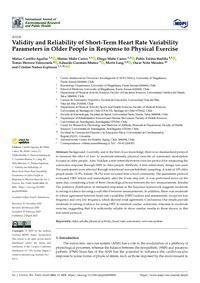Validity and reliability of short-term heart rate variability parameters in older people in response to physical exercise
Autor
Castillo-Aguilar, Matías
Mabe Castro, Matías
Mabe Castro, Diego
Valdés-Badilla, Pablo
Herrera Valenzuela, Tomás
Guzmán-Muñoz, Eduardo
Lang, Morin
Niño Méndez, Oscar
Núñez-Espinosa, Cristian
Fecha
2023Resumen
Background: Currently, and to the best of our knowledge, there is no standardized protocol to measure the effect of low- to moderate-intensity physical exercise on autonomic modulation focused in older people. Aim: Validate a test–retest short-term exercise protocol for measuring the autonomic response through HRV in older people. Methods: A test–retest study design was used. The participants were selected through intentional non-probabilistic sampling. A total of 105 older people (male: 21.9%; female: 78.1%) were recruited from a local community. The assessment protocol evaluated HRV before and immediately after the 2-min step test. It was performed twice on the same day, considering a time of three chronological hours between the two measurements. Results: The posterior distribution of estimated responses in the Bayesian framework suggests moderate to strong evidence favoring a null effect between measurements. In addition, there was moderate to robust agreement between heart rate variability (HRV) indices and assessments, except for low frequency and very low frequency, which showed weak agreement. Conclusions: Our results provide moderate to strong evidence for using HRV to measure cardiac autonomic response to moderate exercise, suggesting that it is sufficiently reliable to show similar results to those shown in this test–retest protocol.
Fuente
International Journal of Environmental Research and Public Health, 20(5), 4456Link de Acceso
Click aquí para ver el documentoIdentificador DOI
doi.org/10.3390/ijerph20054456Colecciones
La publicación tiene asociados los siguientes ficheros de licencia:


